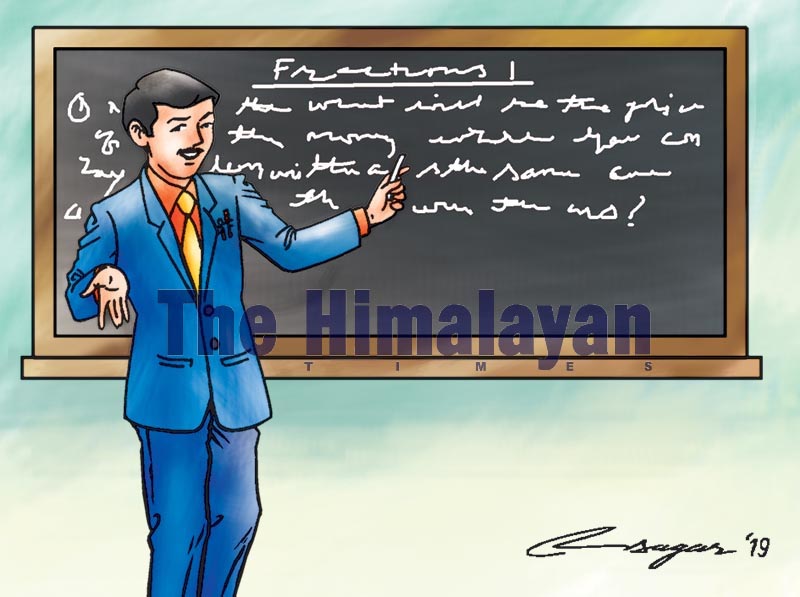Acquiring pedagogical skills: Need for a teaching TVET
For incumbent teachers and aspirants, the acquisition of formal education needs to be simultaneously coupled with practical pedagogical skills, akin to technical and vocational skills in other fields, prior to entering this field
A two-day International Conference on Technical and Vocational Education and Training (TVET) for Employment, Income and Job Quality was held in the second week of September in Dhulikhel. Its emphasis was on empowering the youth via the promotion of the informal and non-formal sector by integrating it with formal education for better job opportunities.
While the conference emcee and this writer couldn’t agree more, he could also not hold back his thoughts on its relevance to pedagogy, in general, and English language teaching, in particular. Theoretical knowledge in every field is vital only to the extent that it makes one knowledgeable while it could be a different scenario altogether when one has to execute and deliver the acquired knowledge. The gap afflicts every other field, with fresh graduates requiring time to develop that much-needed professionalism and expertise. Having been in the field of English language teaching for quite some time, the conference engendered a reflection on this writer that both teachers and aspiring teachers could benefit from the acquisition of general as well as subject-specific skills essential for teaching.
Offering his invaluable insights on technical and vocational education, Prof. Dr. Tanka Nath Sharma, former Dean of Kathmandu University, School of Education, one of the keynote speakers, advocated the need for integration of education and training systems to allow individuals to move within and between systems based on recognition of their knowledge, competencies and skills. However, what if such skills and competencies are not well developed in the first place? What if the existing educational scenario is lopsided heavily towards the ‘knowledge’ aspect of education, putting little weight on competencies and skills? This is particularly true in the field of pedagogy in Nepal. Traditionally, this occupation ails from two prejudices: that it is not worth it, is to be done only till one transitions to something ‘bigger and better’ and that it can be done quite successfully if one has a sound academic background. Thus competencies and skills get totally overlooked.
Against this backdrop, incumbent teachers and aspirants must find ways to acquire pedagogical skills, both general and specific to their subject areas, prior to entering this field. One might contend that with time and practice, they would naturally acquire and hone such skills, but entering a classroom at the outset of one’s career without them is akin to a doctor all set to perform a surgery without having had any practice. The acquisition of formal education, therefore, needs to be simultaneously coupled with practical pedagogical skills akin to technical and vocational skills in other fields.
Take English language teaching, for instance. Since a B. Ed or M. Ed is not a strict requirement when schools or colleges hire teachers, a good number of people having an English major join as English teachers. This is not to suggest in any way that all of them lack the requisite pedagogical and ELT skills. However, everyone is not a natural communicator, not everyone possesses the untaught gift of classroom management, and not everyone may have the writing skills expected to trickle down onto the students. The writer has personally come across a lot of people, including his own friends, who did very well academically, had a sound knowledge of English literature but simply didn’t pursue English teaching for lack of delivery and communication skills. At the risk of over-generalisation, the writer has witnessed similar problems concerning teachers from other subject areas as well. A maths classroom could offer much more if the teacher could design and play with various geometric shapes, devise math quizzes or use up the props and pupils available in the class itself to teach them those dicey math concepts. Ditto with the science class.
Unfortunately, what comes to pass mostly, even with a lot of talk and training, is the same-old stand and deliver tactics. The problem cannot be simply attributed to reluctance on the part of the teachers but that of them not having been trained on the basic as well as subject-specific pedagogical skills alongside the more advanced ones like ICT skills. Learning can indeed be more skill-oriented, and for that to happen, teachers themselves need to be skill-oriented in the first place. Teaching, thus, is also a profession that requires technical and vocational skills concerning pedagogy.
The TVET conference concept note paints a worrying picture that the growing dissociates between the skills that are taught and the skills that are in demand are leaving millions of youth without jobs globally. However, it also expresses hope of increasing youth employability through sustained dialogue and discussion on skills and training. Similar to new industries, a new set of skills are required to meet the expectations of 21st century education as well.
To bridge this skill gap and to help the emerging young teachers acquire novel skills as per the changing time, all the stakeholders, including the government, universities and teacher trainers, amongst others, need to join hands for a coordinated effort. While teacher trainings could focus more on ‘how to teach’ than ‘what to teach’, universities could for starters include a module on pedagogy even for scholars not having education majors.






